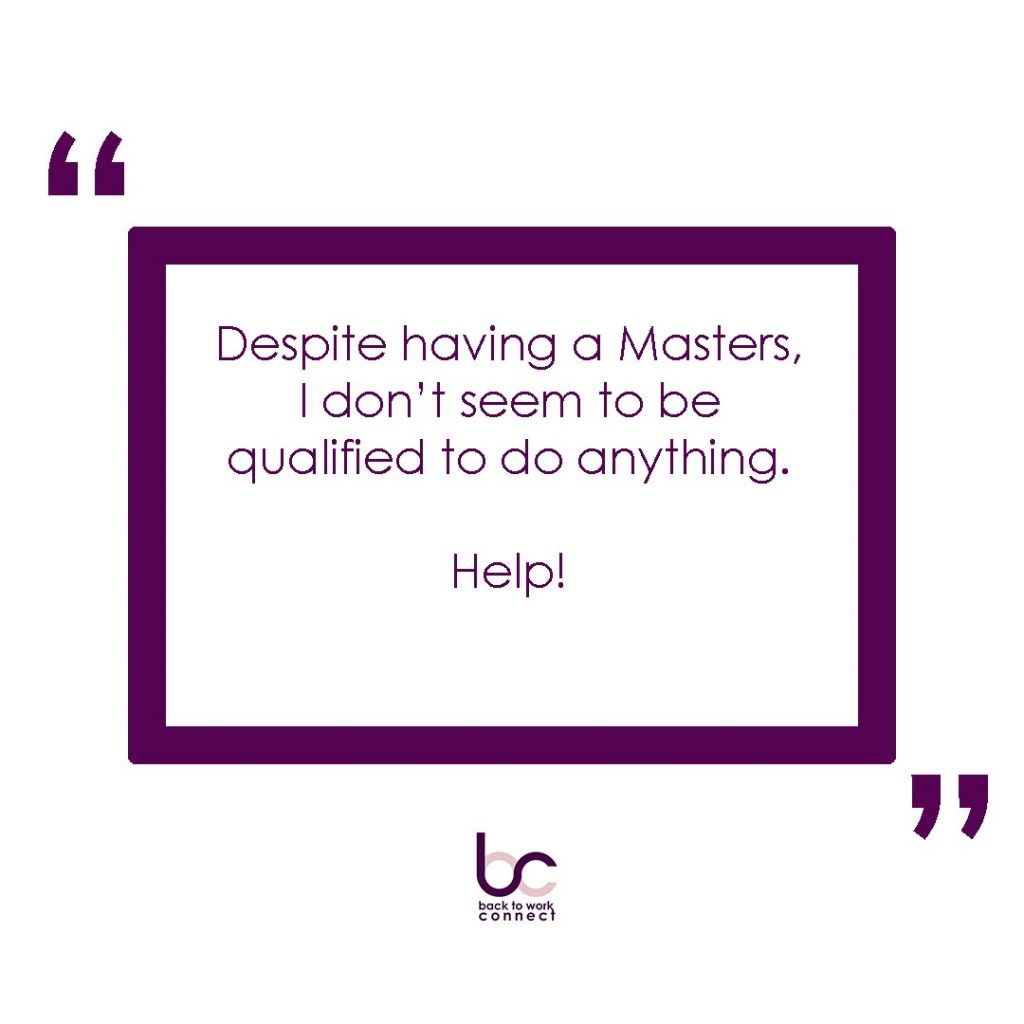A community member recently asked:
“Despite having a Masters, I don’t seem to be qualified to do anything”
Feeling underqualified despite holding a Master’s degree can be disheartening, but there are several strategies to help overcome this situation:

Identify Skill Gaps
Self-Assessment: Reflect on the specific skills and experiences required for your desired roles that you might be lacking.
Job Listings: Review job postings in your field to identify common requirements and compare them with your skill set.
Further Education and Training
Certifications: Consider earning additional certifications that are highly valued in your industry.
Workshops and Courses: Enrol in workshops, online courses, or boot camps to gain specific skills that employers are seeking.
Gain Practical Experience
Internships: Even with a Master’s degree, internships can provide practical experience and networking opportunities.
Volunteer Work: Volunteer for organizations or projects relevant to your field to build your resume and gain hands-on experience.
Freelancing: Take on freelance projects to develop a portfolio that showcases your skills.
Networking
Professional Associations: Join professional organizations related to your field to connect with other professionals and stay updated on industry trends.
Alumni Networks: Leverage your university’s alumni network to find mentors, job opportunities, and advice.
LinkedIn: Use LinkedIn to network with professionals in your field, join relevant groups, and engage with industry content.
Tailor Your Job Search
Customize Your Resume and Cover Letter: Tailor your resume and cover letter to highlight the skills and experiences most relevant to each job you apply for.
Targeted Applications: Focus on applying to positions that align closely with your skills and interests, rather than a broad application approach.
Leverage Transferable Skills
Identify Transferable Skills: Highlight skills such as project management, communication, critical thinking, and any technical skills that are applicable across various roles.
Demonstrate Flexibility: Show how your skills can be adapted to different job requirements, even if they are from a different field.
Seek Career Counselling
University Career Services: Many universities offer career counselling services for alumni.
Professional Career Coaches: Consider hiring a career coach who can provide personalized advice and strategies.
Stay Positive and Persistent
Resilience: Job searching can be a lengthy process, so maintain a positive attitude and stay persistent.
Set Small Goals: Break down your job search into smaller, manageable tasks to stay motivated and track your progress.
Some advice from leading Career change coach & consultant for mid-career professionals who are struggling to find and choose an alternative career path Nicola Porter
This question is about focus. It’s not that there aren’t any options, it’s that there are too many options!
You ARE qualified to do something: a masters results in subject-specific AND transferable skills, as well as knowledge and experience. In addition, you likely have relevant experience from other areas of your life and career.
It’s really hard to align an individual with a career based on a single attribute, like a masters. Yes, of course it can be used as a prompt but the most satisfying option is likely to take into account more than one thing about you, including what you WANT from you career going forward.
For example, from a 20-year career in working with psychology students, I can tell you there are 100s of career possibilities. There are the obvious ones (usually with the word psychologist in the job title) but there are also many alternatives.
I’d suggest a two-pronged approach to this. With my clients, we create a blueprint for who they are and what they want – you can do this too! Start making a note of what you’re good at, for example. And not only what you’re good at, but what you enjoy doing. At the same time, start an ideas list. There are so many places you can get inspiration from sources of inspiration include LinkedIn. Use the search feature to see what’s out there using keywords from your blueprint.
Is there anything that seems to align with what you’re looking for? Start there. Do some career research (e.g. by talking to people) to find out more about whether or not it would suit you and to determine if there’s a skills gap that needs to be filled.
Depending on exactly the right job ad to pop up is a big ask. It might happen but why leave it to chance? The solution may be a role that you haven’t even come across yet. Finding that solution will require you to look inwards and actively explore your options.
Good luck!
Nicola Porter
Keep up to date with the latest Returner Friendly employers, upskilling & retraining opportunities by joining our platform HERE
Sign up to our newsletter & job alert today and never miss the ideal opportunity again ! Sign up HERE





